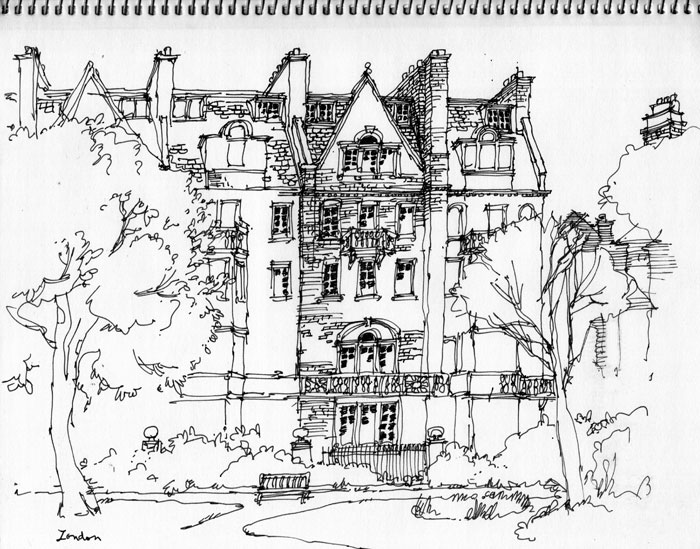I post this travel sketch of a London street in honor of the birthday and birthplace of William Penn (1644-1718), who actually seems to have truly been the laudable character recorded in our childhood history books.
Son of a prosperous knighted admiral and his wife, herself the daughter of a rich Dutch merchant, Penn could have chosen to follow in the footsteps of others of his class, enjoying a life of comfortable privilege on property confiscated by Cromwell from political opponents and dispossessed Irish peasantry. He received the usual rigorous grammar school education accorded boys in his position, studying reading and writing, religion, mathematics, Latin, and Greek from 6am to 6pm, walking the two miles each way between home and the schoolhouse. Be sure to repeat this part to your children when they object to their many burdens.
One Sunday morning, William’s father invited Thomas Loe, a traveling preacher, to lead a service in the family castle. It was an invitation the Admiral had cause to regret, because Mr. Loe, a follower of George Fox, spoke so eloquently of Quakerism that he left a permanent impression upon young William.
At sixteen William went off to Oxford, encountering for the first time extravagantly dressed fellow students who, instead of studying, spent their time, and their parents’ money, playing cards, drinking, and one can only imagine what else. William, however, was drawn to a small handful of progressive, troublesome students who met to discuss surreptitiously such inflammatory subjects as freedom of worship, and who also dared to miss several chapel services. For which they were expelled. Whereas presumably the party-down crowd remained at Oxford as long as they faithfully paid their gambling debts.
Angry and disappointed, Willam’s father gave him a good beating and sent him off on the Grand Tour of Europe to knock some sense into him, an unusual approach to teenage misbehavior not in current use. Perhaps a taste of Parisian society, thought the Admiral, would show William the folly of his queer religious ideas! On the Continent, William acquired fluency in French and a much better wardrobe, but he soon tired of court life and resumed his studies among a group of French Huguenots who (for the moment, anyway) enjoyed an inspiring period of religious freedom.
Back home, although initially cutting an impressive new figure in society, William soon dashed his father’s hopes once again by attending Quaker meetings, sympathizing with the plight of thousands of Quakers imprisoned for their refusal to follow the Church of England, writing to the government in their defense, and eventually serving time in prison himself. On top of this he began to court a Quaker lass. His father was in despair. Beatings, lengthy trips to France, even threats of disinheritance had no effect. What could be done with such recalcitrant offspring?
To Be Continued
Today is also the birthday of Edward Estlin Cummings (1894-1962), known as e e cummings. For a painting and a poem, please see this is the garden.

